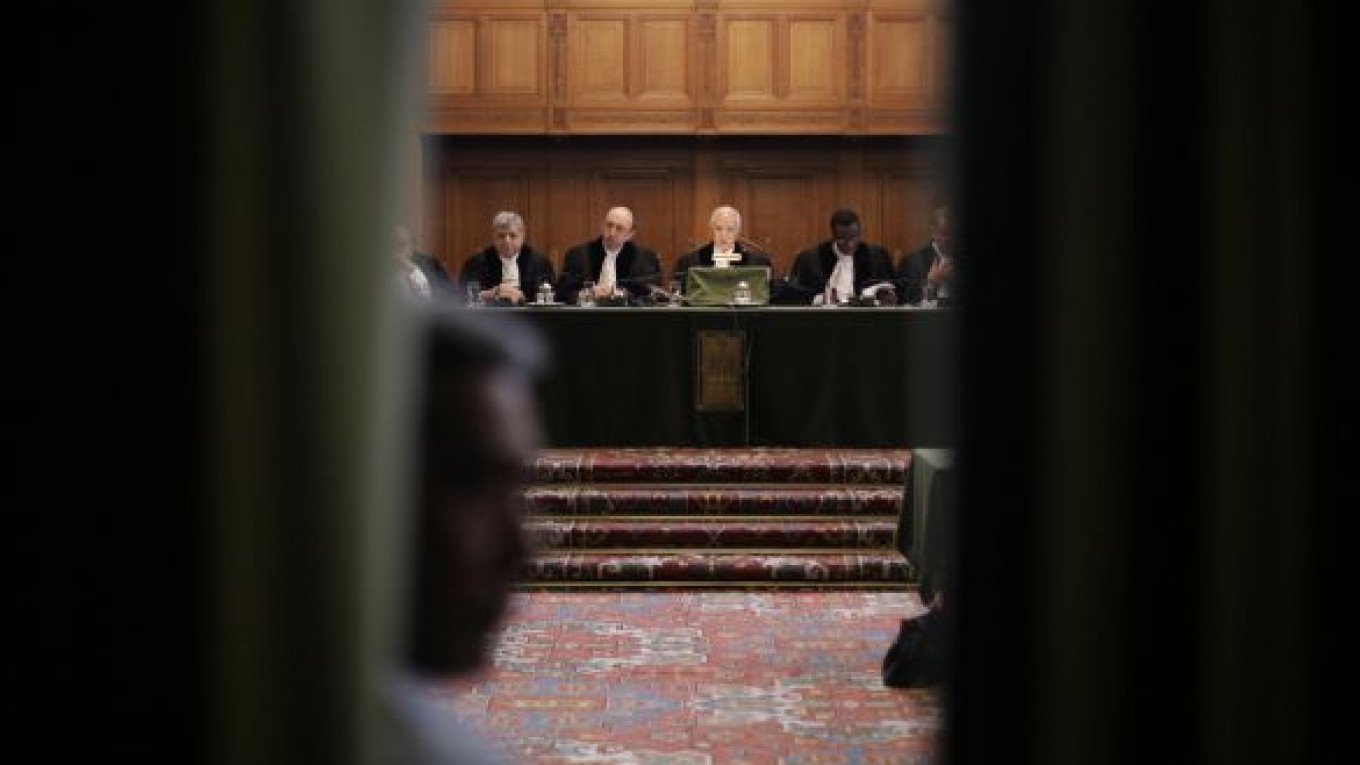THE HAGUE, Netherlands — The United Nations' highest court threw out Georgia's complaint accusing Russia and separatist militias of years of ethnic cleansing in two breakaway Georgian provinces.
Regarding Friday's 10-6 ruling, International Court of Justice President Hisashi Owada said the court had no jurisdiction in the case because Russia and Georgia had never attempted to negotiate a settlement to the dispute before Georgia brought it to the court.
Toward the end of a five-day war in 2008, Georgia filed a complaint that Russian authorities and militias allied to Moscow murdered thousands of ethnic Georgians and displaced some 300,000 people in a two-decade campaign of discrimination in South Ossetia and Abkhazia.
Georgia's deputy justice minister, Tina Burjaliani, said she regretted that the case had been dismissed "on a procedural technicality" but said the ruling left open the possibility of filing a new case at a later date.
"We are certainly disappointed that proceedings will not immediately lead to the examination of the case," she said.
Georgia argued unsuccessfully that the court has jurisdiction under an international convention on the elimination of racial discrimination. But disputes under that convention can only be referred to the court if countries have tried and failed to negotiate a settlement.
The court ruled that even though Russia and Georgia had been at odds for years over the status of the disputed territory, a dispute based on the convention only started during the 2008 conflict and no serious attempt was made to settle it before Georgia filed its case on the last day of the war.
Georgia's foreign minister, Grigol Vashadze, told reporters at UN headquarters in New York he was "tremendously disappointed" and said it appears the court "tried to find some kind of excuse not to consider the case."
"Russia and Georgia have been engaged in bilateral and multilateral talks since 1991, when Russia started undeclared war against my country," Vashadze said, "and to cite this reason, absence of bilateral talks as something ICJ doesn't want to consider Georgia's case for, is absolutely, totally ridiculous."
Russia's UN ambassador, Vitaly Churkin, said Vashadze was "ill-advised" to "try to smear the reputation of this important international legal institution … especially when another important international legal institution, the International Criminal Court, is going to consider the Georgian atrocities in South Ossetia — and we're looking forward to the deliberations on that."
At hearings into the question of the world court's jurisdiction last year, Russia portrayed itself as a mediator and peacemaker in the conflict and said Georgia had never complained of ethnic discrimination until it lost the 2008 war.
A Russian Foreign Ministry legal adviser, Kirill Gevorgyan, welcomed the ruling. "It is a very, very good decision. It is exactly what we were trying to prove to the court," he said.
The war broke out just before midnight Aug. 7, 2008, and ended in a European Union-brokered cease-fire Aug. 12. Georgia filed its complaint to the Hague-based court on the same day.
The case has now ended at the world court, which settles disputes between nations. However, across town, prosecutors at another tribunal — the International Criminal Court — are carrying out a preliminary investigation into individuals on both sides who are suspected of committing war crimes during the brief war.
A Message from The Moscow Times:
Dear readers,
We are facing unprecedented challenges. Russia's Prosecutor General's Office has designated The Moscow Times as an "undesirable" organization, criminalizing our work and putting our staff at risk of prosecution. This follows our earlier unjust labeling as a "foreign agent."
These actions are direct attempts to silence independent journalism in Russia. The authorities claim our work "discredits the decisions of the Russian leadership." We see things differently: we strive to provide accurate, unbiased reporting on Russia.
We, the journalists of The Moscow Times, refuse to be silenced. But to continue our work, we need your help.
Your support, no matter how small, makes a world of difference. If you can, please support us monthly starting from just $2. It's quick to set up, and every contribution makes a significant impact.
By supporting The Moscow Times, you're defending open, independent journalism in the face of repression. Thank you for standing with us.
Remind me later.






